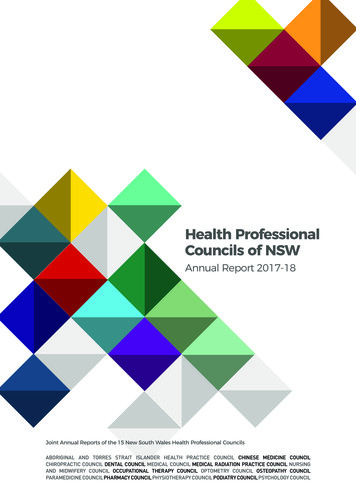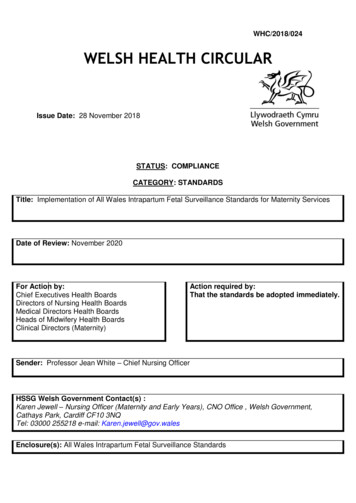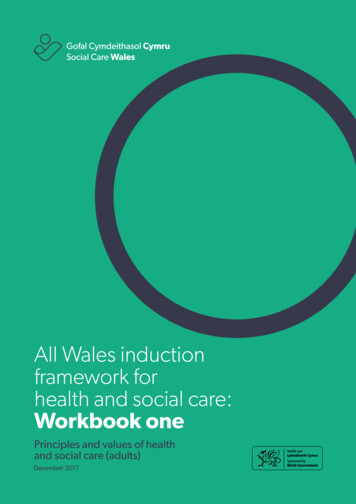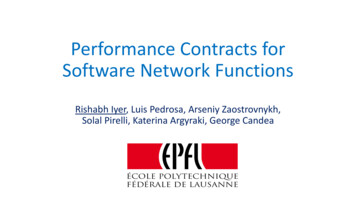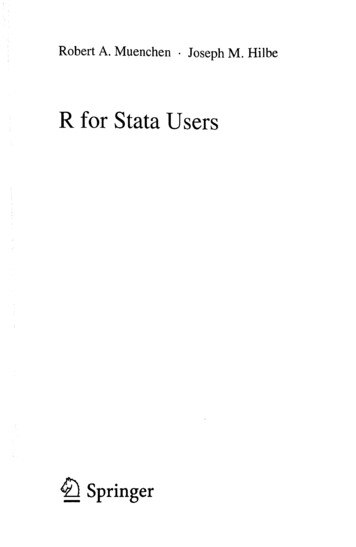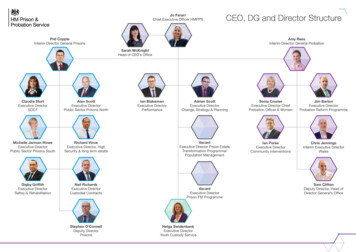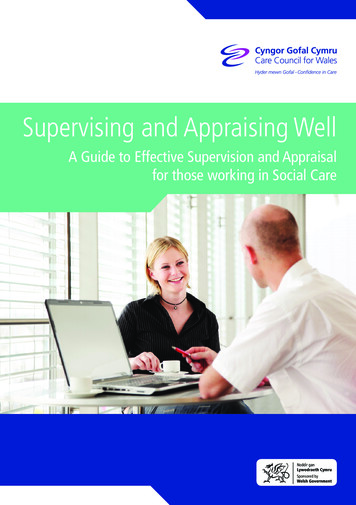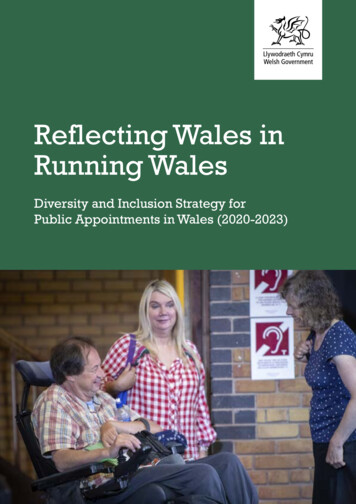
Transcription
Reflecting Wales in Running Wales 1Reflecting Wales inRunning WalesDiversity and Inclusion Strategy forPublic Appointments in Wales (2020-2023)
2 Reflecting Wales in Running WalesCover image: Natasha Hirst @HirstPhotos Crown copyright 2020WG39804Digital ISBN 978-1-80038-207-7Print ISBN 978-1-80038-209-1
Reflecting Wales in Running Wales 3ContentsForeword by Minister5Introduction6Background8Why the Strategy has been developed11The case for diversity and inclusion13Envisaged Future, Mission, Purpose, Values and Goals16Five Goals20Key Actions24Governance34Sustaining the Strategy36Conclusion37Appendix 1: Abbreviations and Terminology38Appendix 2: Public Bodies in Wales (Regulated)39Appendix 3: Statutory Requirements40Appendix 4: Key References41Appendix 5: Key Performance Indicators41Appendix 6: Risks and Responses42
4 Reflecting Wales in Running Wales
Reflecting Wales in Running Wales 5Foreword by MinisterAs Minister with responsibility for public appointments and equality and diversity in Wales,I am committed to ensuring that the public appointments process will support and proactivelyencourage all sections of society to engage in public life.This strategy is an important document because it aims to make Wales an exemplar in nurturingand deploying all Welsh talent – not just some which is familiar, known and comfortable to us.We know that having diverse Boards leads to better decision making by bringing challengeand perspectives from all of society.I am heartened to know that we have made good progress on getting women onto Boards,but the picture for ethnic diversity and for those declaring disability is just not acceptable.This does not reflect the society we live in. Where is the knowledge, experience and voiceof the diverse people that make up Wales? We need to reflect Wales in running Wales.Good practice among some of our Boards needs to be extended across all public bodiesin Wales. To encourage those ready to apply, we will review all our recruitment processes.To build a pipeline of future candidates we will invest in outreach and training anddevelopment. To support existing Board members to truly harness the value of diverse Boards,we will invest in training Boards and Chairs. Finally, to support the required change in culturethrough the leadership of Chairs and others we will ensure consistent messages on the valueof diversity and inclusion.We must use the full breadth of the talent we have in our nation. Appointment to public Boardsshould not be only for in-groups who are known in the system and those informally invitedto apply.We can’t keep doing the same as we’ve always done because doing the same will producethe same results! It is time for change and time for us to actively engage with the change.Jointly we can reflect Wales in running Wales and in so doing nurture all Welsh talent anddeliver superb public services.Jane HuttChief Whip and Deputy Minister
6 Reflecting Wales in Running WalesIntroductionThis strategy aims to make Wales anexemplar in redistributing cultural capitaland nurturing all Welsh talents, by reflectingWales in running Wales.Every year in Wales, approximately 100appointments are made to over 54 PublicBodies (listed in Appendix 2). Theseorganisations provide for many aspectsof our lives, from education to transport,environment to health. Public Bodies delivervital services and impact on everybodyin Wales.The Boards of Public Bodies (hereafter“Boards”) provide leadership and direction,holding senior staff to account, reflectingthe priorities of Welsh communities andproviding expert, independent advice.Members of the public can apply to joinBoards and their Committees in Wales andacross the UK. Board sizes and structuresvary across the public sector, but allappointed members have a non-executiverole, and most are non-remunerated,although expenses are usually covered.All public appointments, made by or onbehalf of Welsh Ministers, are advertisedon the Welsh Government’s website1 aswell as on the UK Government’s publicappointments website2 (key referencesand web links are listed in Appendix 4).There is a UK Office of the Commissionerfor Public Appointments (OCPA) whose roleis to regulate such appointments, monitorwhether they are made in a fair, open andtransparent way, ensure they comply with theGovernance Code on Public Appointments3and investigate complaints as required.The OCPA has a critical role in publishingand commenting on diversity data form anindependent perspective and so measuringprogress.This is a different regulatory structure fromthat for boards of charities, which need tocomply with Charity Law and the CharityCommission’s standards.In Wales the different regulated Boardsare answerable to Welsh Ministers, whoalso appoint the Chair and other Boardmembers. Ministers are advised by AdvisoryAppointment Assessment Panels including arepresentative from the relevant GovernmentDepartment, at least one independent panelmember, and usually – for recruitment ofnon-executive or independent membersof a Board, the Chair of that Public Body.The Welsh Government is currentlydeveloping guidance aimed at making theundertaking of pre-appointment hearingsby the relevant National Assembly for WalesSubject Committees a regular feature ofsome Chair appointments. The rationale is toensure that the recruitment process is astransparent and robust as possible.The Welsh Government is currentlycentralising the Public Appointments Team(PAT)4 within the Public Bodies Unit (PBU),with delegated responsibility from theDeputy Minister and Chief ploads/system/uploads/attachment data/ file/578498/governance code on public appointments 16 12 2016.pdf4Abbreviations and other terminology are explained in Appendix 1.
Reflecting Wales in Running Wales 7
8 Reflecting Wales in Running WalesBackgroundGovernment positionDisabilityIn Wales, the “mainstreaming equality duty”requires Welsh Government Ministers topromote equality of opportunity for all withintheir portfolios. The Welsh Governmenthas adopted an approach of “equality ofoutcome”, in which all should have thesame opportunities, but may need differenttreatment in terms of rights, benefits,responsibilities and opportunities.5Further, the First Minister’s manifestosets out a leadership clearly focussed ondelivering a more equal Wales. This providesa supportive framework for moving forwardwith this strategy.GenderThe Welsh Government’s Gender EqualityReview, conducted by Chwarae Teg, beganin March 2018 and concluded in July 2019.The subsequent “Deeds not Words” reportand roadmap set out the actions the WelshGovernment should take to achieve its boldvision for gender equality in Wales6:“A gender equal Wales means anequal sharing of power, resourcesand influence for all women, menand non-binary people. This is avision where the government aimsto create the conditions for equalityof outcome for all.”Although the Review focused on gender,it very much advocates an intersectional7approach, and recognises that we mustconsider all aspects of equality and theprotected characteristics8.Underlying this strategy is the “Social Modelof Disability”. This recognises the needfor society to be transformed, removingbarriers so that disabled people are ableto participate fully.It recognises that people withimpairments are disabled by barriersthat commonly exist in society.These include negative attitudes,and organisational and environmentalbarriers resulting in discrimination;these all prevent disabled people’sinclusion and participation in allareas of life.These problems also apply to publicappointments.The Social Model of Disability iswell‑established and was adopted by theWelsh Government in 2002.In September 2019, the Welsh Governmentlaunched its “Action on Disability:The Right to Independent Living Frameworkand Action Plan”9. Integral to that planis the need for a more equitable publicappointments system that serves everybodyand results in Boards that fully reflect thediverse peoples of Wales.In 2018 the UK and Welsh Governmentaccepted the independent Lord HolmesReview about the barriers faced by disabledpeople applying for public appointmentsand how they should be review/#phase-two7“Intersectional”: reflecting the way in which characteristics, such as gender, race or class, can interact and produce unique and often multiple experiences and disadvantage.8Protected characteristics are: age, disability, gender reassignment, marriage and civil partnership, pregnancy and maternity, race, religion or belief,sex, sexual nt/uploads/system/uploads/attachment data/file/760721/Lord-Holmes-Review-full.pdf
Reflecting Wales in Running Wales 9Present DataGiven the target of a balance of 50:50by 2020 for women and men in public life,and following recent good work done bywomen’s organisations in Wales11, Ministersand stakeholders have been greatlyencouraged by the increase in appointmentsand reappointments of women to Boards(in Wales 63.5% were women in 2018/19,according to the Annual Report (2018/19)of the UK’s Commissioner for PublicAppointments12).There is concern however aboutthe low proportions of Black,Asian and Minority Ethnic(BAME)13 people (3.0%) andpeople declaring disability (5.1%)appointed to Boards in Wales (asfor gender, these are proportionsof the 128 appointments andreappointments in the Annual Reportfor 2018/19). The BAME populationin Wales is 5% (2019 APS data) andthe proportion of working-age adultswho are disabled is 22%.In his Annual Report the UK Commissionerfor Public Appointments comments that forthe UK “There has been welcome progressin the appointment of Black, Asian andMinority Ethnic (BAME) candidates, witha higher proportion of applicants from thesebackgrounds, and more progressing frominterview to appointment.”However, across the UK, for “candidatesdeclaring disabilities, the story is lesspositive with a slight decrease in the numberof appointments and reappointments beingmade. As with previous years, the proportionof candidates declaring a disability thatprogressed from shortlist and interview toappointment was lower than those declaringno disability.The failure to translate increasedrepresentation of women, BAME andcandidates declaring disabilities at boardlevel into a higher number of chairs fromthese backgrounds is worrying, and requiresurgent attention from departments andpublic bodies.” More needs to be done toencourage people from protected groupsto apply for Chair es-2018-mentoring-scheme & EYST BAME routes to public life mentoring report 2019.Obtain from CPA-Annual-Report.pdf13There is a wide range of terminology for ethnicity and different groups and individuals may prefer different labels. Currently BAME is in wide use inGovernment publications.
10 Reflecting Wales in Running WalesOur Own ResearchTo inform this strategy, officials conducteddesk research and interviewed more thanforty individuals involved in the publicappointment process and from the widerequality policy arena. Officials also helda stakeholder event which includedrepresentatives from Boards, equalityorganisations, and other partners whosupport the appointment system. A finalconsultation event with a Senior PublicServices Leaders Group was also held.Their responses, including the good practicealready in place, have provided importantevidence and in this document theircontributions are often used as quotes.One key finding from the interviewsand information gathered is that there isa general lack of awareness and knowledgeof what public bodies exist and what theyactually do. This means that many peopleare not “put off” or feeling that it is an unfairprocess, rather they do not even knowof the potential opportunities in the firstplace. This is particularly so for those notin the traditional loop – often from the thirdsector – but also from the corporate andprivate sector.The biggest challenge is that we do not havecomprehensive baseline data, includinglocation data, to agree meaningful targetsfor Wales. Whilst there are targets (50:50by 2020) for women in public life thathave given clear signals of commitmentto improvement by senior leaders, and sosupported the increase in women on Boards,there are no targets for BAME, disabled orother protected groups14.14Protected groups are people distinguished by protected characteristics.Some individual Boards have beeninnovative and have set their own targets toreflect the communities they serve. Othershave developed extensive outreach andpositive action initiatives to attract andretain a more diverse Board. Sport Walesand the Design Commission for Wales aregood examples of both approaches. Anotherexample is the recruitment process formagistrates, which involves effective use ofrole models, observation of magistrates inaction, and post-appointment mentoring.This strategy is not just about diversity interms of numbers. It is also about promotinggenuine inclusion of everyone who serveson a Board, so that they can contribute to thefullest extent possible using their uniquetalents and in so doing explicitly drivebetter outputs and outcomes for ALL citizensthrough enhanced delivery that meets theirdiverse needs and expectations. All thiswill improve the quality, tone and culture ofBoards, support participation in decisionmaking, and enhance good governance.
Reflecting Wales in Running Wales 11Why the Strategy has been developedWhy now?What is this strategy?The First Minister, the Rt Hon ProfessorMark Drakeford AM, and his Cabinethave stated the urgency for leadership inWelsh public life to reflect the diverse andinclusive society that is Wales. The WelshGovernment’s “Delivering Together” reportin 201715 suggested a need to centralise thedelivery of public service appointmentswithin the Welsh Government, so thatconsistent standards for recruitment couldbe applied. It also highlighted a need toredress the lack of diversity on Welsh Boardsby focusing on disabled people and BAMEgroups. Strong Ministerial leadership toachieve equality of outcomes for all citizens,with the voice of lived experience at thecentre of its thinking, has informed theapproach and outcomes of this strategy.This document builds on the good workdone by the report delivered by LordHolmes and the work done to get women onBoards. It describes a strategy for the yearsto 2023 and outlines a vision of the futureenvisaged in 2030 if this strategy is fullyimplemented, together with a mission thatleads to that future, and the values that willunderpin the journey. It also summarisesthe transformational goals and underlyingactions and timescales for the first year thatwill help to deliver substantial progress by2023. KPIs have also being developed, toallow effective assessment of progress.The gathering of evidence from interviewsand stakeholder events underpins the keyactions in the strategy. These discussionsrevealed that there is a feeling, particularlyamong people in protected groups, thatthe culture of public appointments stillmakes it easier to be appointed if you arepart of a favoured “in-group”. Almost allof those interviewed, and especially thosefrom protected groups, lack confidence inthe public appointments process, feelingit is neither open nor transparent. There is,therefore, a need to create more positiveprocesses for advertising, recruitingand interviewing which recognisethe value of lived experience and thetransferable skills that protected groupscan offer. This document uses quotes fromstakeholders or interviewees to illustrate thestrength of feeling and to reflect the livedexperiences of the appointments system.15Whom is the strategy for?This strategy is written for communities,public services, Board members, andothers so that they can understand theWelsh Government’s approach, and to helpcommunities to hold the Government toaccount. A process of continuous learningand reflection is being built in from theoutset.The strategy is focused on the workof regulated Boards only, but with thehope and intention that it will encouragenon‑regulated bodies, task groups, charitiesand others to adopt the good practicesit describes.Douch J & Rosser D, “Delivering Together - Strengthening the Welsh Government’s Sponsorship of Arms-length Bodies”, Final Report,26 October 2017
12 Reflecting Wales in Running Wales
Reflecting Wales in Running Wales 13The case for diversity and inclusionThere is a strong moral, legislative andbusiness case for diversity and inclusion.The moral case is based on principles ofhuman rights, equality, social justice, anddemocracy: those who govern Public Bodiesshould be representative of the communitiesthat they serve.The legislative obligations includesthe Equality Act 2010, the Public SectorEquality Duty, and the Well-being of FutureGenerations (Wales) Act 2015 whichseek to redress inequalities and create afairer Wales. Statutory requirements aresummarised in Appendix 3. The. Equalityand Human Rights Commission report on“Is Wales Fairer”16 describes progress in thediversity of Public Boards.Wales has made huge strides in relationto gender equality as outlined in otherstrategies such as the Gender EqualityReview17. The momentum for this needs to bemaintained. For Wales, in the coming years,the challenge of under-representation ofBAME and disabled people requires urgentredress. Previous actions have not led tosignificant progress. The needs of LGBT 18people, young people and those from lowersocio-economic groups also need to beaddressed if Wales is to fulfil its ambition touse the full talent at its disposal.The business case for diversity andinclusion also rests on the full use of talent.Lord Holmes in his report argues that“This would be using the full talents of all inour society – not just of the elite”. ProfessorOgbonna in his paper on BAME in theworkforce19 refers to the “explosion” of thepopulation in the future which will be fromdiverse backgrounds and which will offera pool of talent in coming generations.Research confirms that there are clearbusiness benefits. For instance:– A McKinsey study of 366 companiesin four countries in 201520 showed“a statistically significant relationshipbetween a more diverse leadership teamand better financial performance. Companies in the top quartile of racial/ethnic diversity were 35 percent morelikely to have financial returns above theirnational industry median”.– A Boston Consulting Group study ofmore than 1,700 companies in eightcountries in 201821 showed “a strongand statistically significant correlationbetween the diversity of managementteams and overall innovation. Companiesthat reported above-average diversityon their management teams alsoreported innovation revenue that was19 percentage points higher than thatof companies with below-averageleadership diversity - 45% of totalrevenue versus just 26%.” (“Innovationrevenue” is sales of products or serviceslaunched in the previous three years.)Thus, diverse Boards:– ensure that they tap the full wealth ofknowledge, talent and creativity available– access the full range of people and livedexperiences among those who use theorganisations’ services, resulting in afuller understanding of how they operatein practice and hence better strategicdecisions that reflect the diverse needsof the communities they eteg.com/projects/gender-equality-review/18LGBT stands for: L - Lesbian, G - Gay, B - Bisexual, T – Trans, - all of the other sexualities, sexes, and genders that are not included in these /001872670606418120Hunt V, Layton D & Prince S, “Diversity Matters”, McKinsey 201521Lorenzo R, Voigt N, Tsusaka M, Krentz M & Abouzahr K, “How Diverse Leadership Teams Boost Innovation”, BCG 2018.
14 Reflecting Wales in Running Wales– are able to be more creative and strongerin their key roles of supporting andchallenging those in senior positionswithin organisations– bring challenge and naïve questions toraise issues that might otherwise be leftuntouched.These advantages also apply in relation tosecuring more Board members from lowersocio-economic groups and young people.In other words, progressing inclusion andequality is not just a moral issue, but alsoan economic concern. Professor Ogbonna,from Cardiff University, in a recent lectureto leaders in public services statedthat the economic benefit of full BAMErepresentation is estimated to be 24bnper annum (McGregor-Smith, 2017).22The Parker review (2017)23 recommendedthat members of the FTSE 100 and FTSE250 should develop mechanisms to identify,develop and promote diversity within theirorganisations in order to ensure over timethat there is a pipeline of Board capablecandidates and their managerial andexecutive ranks appropriately reflect theimportance of diversity to their organisation.As a result of the interviews with differentstakeholders five goals were identifiedand these were tested with those attendinga stakeholder event in October 2019. Duringthe stakeholder event participants wereasked to imagine what Boards and Boardappointments might look like in 2030. Theydeveloped a statement of purpose for thestrategy together with a mission that reflectsit and values that underpin it. They alsorefined the five goals and identified barriersand opportunities in progressing the goals.Their views were further developed ata consultation event of the Senior PublicLeaders’ Forum. The page below summarisestheir views, using their own words wherepossible.Enormous social, economic, environmentaland cultural challenges face public services,other sectors and communities more widely.Given this, it is important to gather the viewsof the full, diverse range of people in Wales.This includes younger people, who bringparticular advantages in informing boardson their unique overnment/uploads/system/uploads/attachment ker-review-published
Reflecting Wales in Running Wales 15
16 Reflecting Wales in Running WalesEnvisaged Future by 2030We envisage that if we work together to address thisissue, for the good of all citizens in Wales, ourachievements by 2030 will include: Diversity, inclusion and fairness will be embedded across the system of public appointments. There will no longer be a need for a strategy to ensure that Boards are diverse and inclusive. The rest of the UK and the wider world will look to us for how we have changed the transparencyand culture of our appointments systems, discovering, inviting and nurturing all skills,knowledge and talents. Ministers and all politicians of all parties will uphold the importance of this work, consistentlysupporting and driving it – they will not falter in inviting and nurturing all talent. We had role models that made us feel it was for us. Stakeholders and government won’t be put off course – our vision and values will drive it overthe years, tackling the difficulties that arise. Asking if we have the right numbers for the right balance won’t be needed, Boards will benoticeably different. Disabled people and other groups will have their voices heard on an equal footing – “nounconscious bias please and if challenged we won’t be made to feel that we are the problem”. Our strategy is a living document, monitored and adjusted annually, with measurable outcomes. We brought in changes that were sustainable and signed into by leadership.
Reflecting Wales in Running Wales 17Strategy 2020-2023Our valuesVisionReflecting Wales in running WalesTo ensure that decision making in Walesutilises all the talents, voices and livedexperience of the peoples of Wales, andis more inclusive so as to achieve betteroutcomes for all citizens.PurposeTo sustain the increased numbers ofwomen on Boards and to increase thenumber of disabled, BAME, and otherunder-represented people in appointmentsto Boards so that Boards reflect thecommunities we serve and thereforeimprove decision making.TransparencyWe are open about allwe do, so that there is nomystery about who didwhat and why and howwe invited, nurtured andrecruited talent from allparts of our society.IntegrityWe recognise ourunconscious biasesand monitor them.InclusionWe involve all, valuing,respecting andpositively welcomingthe challenges ofdiverse ideas, viewsand lived experiences.
18 Reflecting Wales in Running WalesOur 5 GoalsGoal 1:To gather andshare dataGather & share consistent,reliable, qualitative &quantitative data.Goal 2:To build arobust pipelineCreate a robust pipeline ofpotential Board membersby making more aware andsupporting talent.Goal 3:To secure openand transparentrecruitment practicesDevelop, test and establish new inclusive &transparent recruitment processes. Goal 5:To strengthenleadershipSecure and sustainleadership commitment.Goal 4:To get Boardson boardEnsure all Board membersare skilled & knowledgeableabout equality, diversity& inclusion.
Reflecting Wales in Running Wales 19
20 Reflecting Wales in Running WalesFive GoalsBy co-producing the strategy with different stakeholders, five goals have been identified:GOAL 1To gather andshare data.GOAL 2To build acommunity ofindividuals whoare interested,aware andnearly readyfor Boardmembership(i.e. to builda robustpipeline).GOAL 3To secure openand transparentrecruitmentpractices.Each has a series of linked actions, outlinedfor 2020-2021, by which we will achieve thegoal. Further details are given in our ActionPlan 2020-202124.The current appointment system arguablyfavours those already within the networkof professionals privileged to be Boardmembers, often by virtue of their extensiveknowledge and experience of publicservice, and their ability to give the timeand commitment, which is often unpaid.This is further confounded by decisionmaking at all levels, including at Ministeriallevels, which may favour some more thanothers. Several interviewees commentedalong the lines: “these members are oftenreappointed and so we see the same oldfaces on different Boards”. Intervieweesalso suggested that “this can also involvesupporting close allies and friends toenter the appointments system”. One veryexperienced and senior BAME leader whohad not applied for appointments arguedthat he would not consider applying as thesystem of appointments was “by invitationonly and for those in favoured in-groups andpositions”. GOAL 4GOAL 5To get Boardson board.To strengthenleadership.Some also reported that often ministerialdecision making validating/confirmingrecommended appointments, especiallyat Chair level, can have adverse effects.Others reported that Ministers have beenkey in helping to challenge the shortlists andrecommendations which may have bias intheir decisions.One senior leader felt that there werenegative perceptions of who was andwho was not in the pipeline, ready to apply.The search for potential candidates, hesuggested, “is restricted to some sectors andwe need to look wider – in the private andother sectors”.This strategy aims to:– create more open and more transparentprocesses at all levels of decision makingincluding advertising, recruiting andinterviewing and further up the chain– challenge barriers faced by protectedgroups such as limited remuneration,access difficulties, unconscious bias andothers– create systems that use all talents andrespect difference and that are based onthe lived experience of protected groups.
Reflecting Wales in Running Wales 21The goals are built on existing examplesof good practice by Boards and othersand seek to create equity throughout thesystem. They aim to create culture change.As one stakeholder argued; “Cultureeats strategy”, thus by attending to theleadership and culture of the appointmentsystem and Boards, the strategy will createa more fundamental change. Similarly,communicating the goals to all is a vitalnext step.How does everything fit together?The diagram below summarises the meansby which we shall achieve our mission.All components of the strategy are mutuallysupportive, with the five goals feeding intoeach other. The need to create open andtransparent recruitment practices needsto run in parallel to creating a pipeline ofpotential applicants. A pipeline of trainedand supported applicants need to havea good experience of the appointmentssystem irrespective of their success orfailure as they need to be assured that theyhave entered a fair and open system and socan be positive advocates of it for others.The goal of strengthened and sustainedleadership is the backbone to creatingthe culture change needed. Leaders needto understand the implications of lack oftransparency and openness, of the role ofunconscious bias in decision making, and ofnot using the full talents of Wales. They needto drive change and implement the visionthrough action. This is crucial for holding thegoals as reins for the hoped-for change.It is also necessary to prepare the currentcohort of Board members, to get Boards onboard. When interviewed and at stakeholdermeetings, Board members from outsideprotected groups have shown a keen interestin wanting to understand and supportdiversity. Working together with protectedgroups they can achieve far more thanprotected groups on their own.It is essential to gath
This does not reflect the society we live in. Where is the knowledge, experience and voice of the diverse people that make up Wales? We need to reflect Wales in running Wales. Good practice among some of our Boards needs to be extended across all public bodies in Wales. To encourage those ready to apply, we will review all our recruitment .
